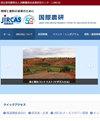Technology Development for Stable Agricultural Production under Adverse Environments and Changing Climate Conditions
IF 0.5
4区 农林科学
Q4 AGRICULTURE, MULTIDISCIPLINARY
引用次数: 0
Abstract
The second of the United Nations’ 17 Sustainable Development Goals aims to end hunger, achieve food security and improve nutrition, and promote sustainable agriculture. However, it is well known that the agricultural potential in developing regions including Africa has not been fully realized because adverse environments and changing climate conditions impose abiotic (e.g., low soil fertility, droughts) and biotic (e.g., pests, diseases) stresses on plant growth and development. To ensure food and nutrition security in such regions, the Environmental Stress-tolerant Crops project, the High-yielding Biomass Crops project and the Pest and Disease Control project in the Program for Stable Agricultural Production at the Japan International Research Center for Agricultural Sciences aimed to develop technologies and crops with high productivity and adaptability to adverse environments and changing climate conditions. In order to develop crops with environmental stress tolerance and disease resistance, we have clarified and used the genes and loci involved in these traits toward the development of breeding materials. And in order to develop technology for effectively controlling transboundary pests, we have elucidated the ecology of their occurrence and developed pest management technology based on that information. We hope that these materials and technologies will contribute to achieving food and nutrition security in developing regions.不利环境和气候变化条件下稳定农业生产的技术开发
联合国17个可持续发展目标中的第二个目标旨在消除饥饿,实现粮食安全和改善营养,并促进可持续农业。然而,众所周知,包括非洲在内的发展中区域的农业潜力尚未充分发挥,因为不利的环境和不断变化的气候条件对植物的生长和发育造成了非生物(如土壤肥力低、干旱)和生物(如病虫害)的压力。为确保这些地区的粮食和营养安全,日本国际农业科学研究中心的“环境抗逆性作物项目”、“高产生物质作物项目”和“稳定农业生产计划”中的“病虫害防治项目”旨在开发具有高产能、适应恶劣环境和气候变化条件的技术和作物。为了培育具有环境抗性和抗病性的作物,我们对这些性状所涉及的基因和位点进行了澄清和利用,用于育种材料的开发。为了开发有效控制越境有害生物的技术,我们阐明了越境有害生物发生的生态环境,并在此基础上开发了越境有害生物管理技术。我们希望这些材料和技术将有助于在发展中地区实现粮食和营养安全。
本文章由计算机程序翻译,如有差异,请以英文原文为准。
求助全文
约1分钟内获得全文
求助全文
来源期刊
CiteScore
1.00
自引率
25.00%
发文量
42
审稿时长
>36 weeks
期刊介绍:
The Japan Agricultural Research Quarterly (JARQ) is a publication of the Japan International Research Center for Agricultural Sciences (JIRCAS), which provides readers overseas with the latest information on key achievements and developments in agricultural research in Japan, with the expectation that this information would contribute to the agricultural development of countries in tropical and subtropical regions.

 求助内容:
求助内容: 应助结果提醒方式:
应助结果提醒方式:


